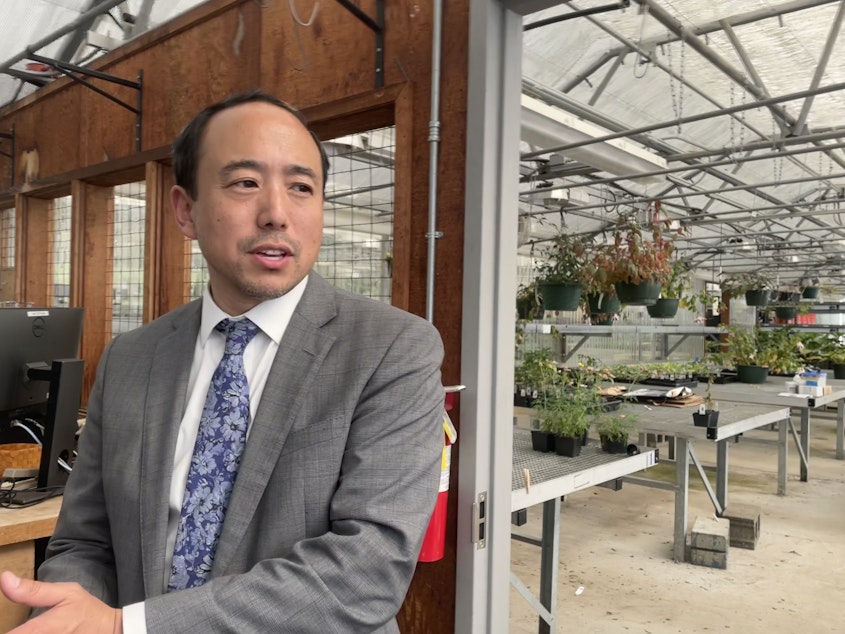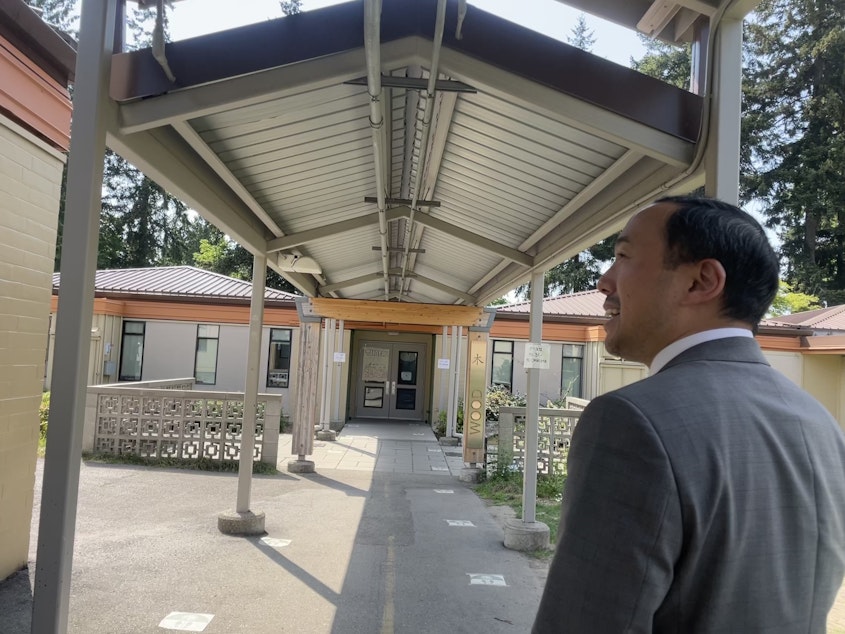Bellevue’s first Asian American superintendent reflects on his family’s 120-year US journey

Kelly Aramaki stands on a Lake Bellevue dock overlooking his hometown.
The lakeshore before him is filled with restaurants, condos, and shops. Aramaki went to school and started his teaching career in Bellevue. It’s been his family’s home for five generations.
It didn’t look like this back in 1900, when Aramaki’s great grandfather, Hikotaro, arrived here from Japan.
Aramaki points out the towering Bellevue skyline.
“Before the buildings, it was all farmland,” Aramaki said one sunny day in May. “Japanese Americans were raising strawberries and blueberries.”
Sponsored
But when Aramaki’s great grandfather arrived in Washington, he wasn’t able to farm. Back then, Japanese immigrants couldn’t own farmland, so he had to wait until his first son, Aramaki’s grandfather, was born. By law, the infant was the only American citizen in their family, so the land belonged to him.
Then, right after Pearl Harbor in 1942, more than 100,000 Japanese Americans were forced from their homes and put in internment camps. Aramaki’s family almost lost the farm.
Fast forward 80 years, and Aramaki is starting the new school year as Bellevue School District’s first-ever Asian American superintendent. A month before he officially assumed the district's top job, Aramaki took a KUOW reporter on a tour of places in Bellevue — the city and its schools — that shaped who he is today and his vision for the district.
“The fact that my great grandfather couldn’t own land when he got here … and how all these generations later, I find myself as the superintendent of the school district,” Aramaki said. “I mean, it’s an amazing thing to me.”

Sponsored
Aramaki's appointment is a big step for Bellevue, which used to be known as a mostly white suburb of Seattle.
In recent years, it has evolved into one of the largest city centers in Washington — a booming economic hub that is becoming increasingly diverse.
A few years ago, Bellevue crossed a threshold. More than half of its residents now identify as non-white, and census data shows about 40% of Bellevue residents were born in a foreign country.
The school district’s population has shifted, too: The number of Hispanic students is climbing, and nearly half of the student body is Asian, and they speak languages at home other than English.
“We have people from all over the world who come here for better opportunities and a better life,” Aramaki said. “And I want to be part of that story.”
Sponsored
But Aramaki is taking the helm of Bellevue’s school system at a financially precarious time.
In the wake of the pandemic, many public schools are grappling with declining enrollment, and that’s forcing officials to make severe budget cuts.
Bellevue lost about 10% of its students over the last three years, leading to a budget deficit of $20 million this school year. To bridge the gap, the school board voted earlier this year to close Wilburton and Eastgate elementary schools.
Parents wearing school T-shirts and carrying homemade signs flooded closure meetings.
“I’m the parent of a second and fifth grader at what is currently known as Eastgate,” one mother said as she broke down in tears at a meeting in February. “I’m really, really frustrated.”
Sponsored
Said another: “You have destroyed community trust with your imprudent, hasty timeline, draconian process, and ambiguous communications. You cannot fix this. This is shameful.”
Aramaki had just been named Bellevue’s next superintendent.
“I wouldn’t say it’s like the best way to start a job,” Aramaki recalled. “But it was a conversation that needed to happen.”
Bellevue isn’t out of the weeds yet: Enrollment is projected to shrink another 8% over the next decade. But Aramaki says he’s ready to tackle it.
“I think the worst thing that we could do for our kids and for the community is to not be in control of our finances, and then just be constantly cutting and trimming back,” Aramaki said. “That is not the kind of future that we want.”
Sponsored
And he’s got a lot of ideas for his tenure leading the district.
One of them is expanding the district’s existing dual-language programs. Right now, kids can learn Spanish, Mandarin, and — new this year — Arabic. In the coming years, Aramaki hopes to add Hindi, Korean, and Japanese.
Aramaki also hopes to expand academic offerings beyond languages, from college and Advanced Placement courses to career and technical education classes.
During a visit to his alma mater, Newport High, in May, Aramaki showed off the elaborate industrial kitchen where kids are getting a jumpstart on careers as a chef or a caterer.
“When I walk through Newport High School, the thing that strikes me is the classes,” he said, noting he thinks the school only had one Advanced Placement course when he was there. “The things that we offer now are so much more interesting and diverse than when I was in high school.”
He also touted Newport’s 300-level college course in cybersecurity. And he trumpeted Interlake High School’s horticulture program, which teaches students about environmental sustainability and nursery operations in a real greenhouse on campus.
That’s the future he wants for Bellevue.
“Innovation is one of my kind of 10-year goals I want as we come through the pandemic,” he said. “Whatever our students can dream, we want to be able to do with and for them.”




